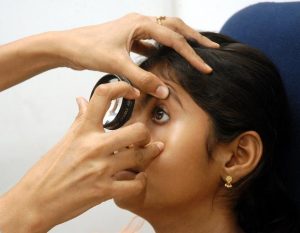 The Chief Executive of The Queen Elizabeth Diamond Jubilee Trust (the Trust), Dr Astrid Bonfield CBE, today met with leading eye health experts to thank and commend them for their
The Chief Executive of The Queen Elizabeth Diamond Jubilee Trust (the Trust), Dr Astrid Bonfield CBE, today met with leading eye health experts to thank and commend them for their
efforts to prevent blindness across Fiji.
In the Pacific, four out of five people who are blind don’t need to be. Many people across the region who are blind – or are at risk of blindness – are so because they don’t have access to
affordable eye care. Since 2014, The Trust has been working with the Ministry of Health, The Fred Hollows Foundation NZ and The Fred Hollows Foundation to help bring affordable, quality
eye care to people in Fiji, including those who live in the most remote of communities, whohave – or are at risk of – diabetic retinopathy and trachoma.
Diabetic retinopathy, also referred to as diabetes eye disease, is a complication of diabetes and is the fastest growing cause of blindness globally. It occurs when poor control of blood sugar
levels, high blood pressure and high lipid levels in the blood damage the blood vessels in the retina. If left untreated, it can lead to irreversible blindness.
Over half of all people with diabetes are unaware they have the condition, and by the time their vision deteriorates is it often too late for treatment. Regular screening, early treatment,
and careful health management can reduce the risk of vision loss by 95% and is crucial to ensuring people with diabetes do not go blind when their sight could be saved.
Trachoma is the world’s leading infectious cause of blindness. It is easily spread from person to person and is most commonly found in poor, rural communities with limited access to clean
water and sanitation. Repeated infection causes scar tissue to develop in the eyelid, and if left untreated the eyelashes eventually turn inward, scraping the surface of the eye. With every
blink, people slowly and painfully lose their sight.
Diabetic eye disease is quickly becoming the third most common cause of low-vision in Fiji. The Trust, together with its partner The Fred Hollows Foundation NZ, has worked with the Ministry
of Health in Fiji to secure permanent changes to the health system by integrating screening and quality treatment for diabetic retinopathy into the care provided to people with diabetes.
By making long-term improvements to the public health system, the Trust’s aim has been to protect the sight of all those who have diabetes in Fiji, as well as those at risk of developing the
disease in the future.
Thanks to the commitment and leadership of the Ministry of Health, with support from the Trust’s funding, almost 21,000 people with diabetes in Fiji have been screened for diabetic
retinopathy and over 5,350 people have now received treatment to prevent them from going blind.
The Trust with its partners has sought to raise awareness of diabetes eye disease across Fiji and build capacity by training 538 primary health carers and 635 community health workers to
help refer patients for screening. In addition, almost £125,000 in diabetic retinopathy equipment has been donated by the Trust and outreach teams have visited communities 245
times since 2015, resulting in over 4,900 people being screened to see if they had diabetic eye disease.
In the fight against trachoma, working with The Fred Hollows Foundation and the World Health Organization’s Division of Pacific Technical Support in Suva, the Trust has helped to map the
prevalence of trachoma across Fiji, which is on track to be completed in August 2019. High quality data is vital in the fight against trachoma for tracking where progress has been made
and identifying where further interventions are required to ensure no-one remains at risk of trachoma. Four healthcare workers have also been certified as either Trachoma Grader
Trainers or Recorders – who play a crucial role in contributing towards the now much more accurate picture of the rates of trachoma across Fiji.
Speaking about the work in Fiji, Dr Astrid Bonfield said: “Fiji has achieved significant progress over the past four years to bring quality eye care to its people. The efforts of the Ministry of Health and our partners in fighting trachoma and providing eye health care across Fiji is ensuring people are protected against entirely avoidable forms of blindness each and every day.
I am very grateful for the Ministry of Health’s engagement in the Trust’s programme. When Commonwealth Heads of Government met in London last year, they agreed that they would
“take action towards achieving access to quality eye care for all…”. By both tackling trachoma and establishing local services which provide quality eye care for all people with diabetes is a
strong response by Fiji to that commitment – and one in which the Trust is very proud to have played a part. I am encouraged from all I’ve seen here that the country’s commitment to
ensuring people receive quality eye care will continue long into the future.”
